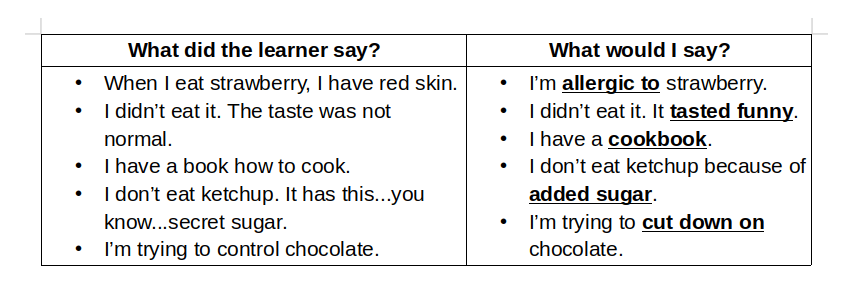When we teach, we mainly build our lessons around target language. Target language is the language points that the teacher or coursebook has decided beforehand will be learnt in the lesson and which form the main aims of the lesson. However, such approach to coursebuilding has been criticized quite a lot. Why should someone decide which words my students will find useful? What if they need more lexis or absolutely different lexis? These questions led to the shift of focus from target language into emergent language.
What is emergent language?
Emergent language is an unplanned language that comes up in interactions between the students, and/or the teacher and the students. It’s the language that learners use when trying to express something that is relevant for them at that moment. It also includes mistakes or communicative breakdowns produced by students, as well as something new, interesting or good to share. The teacher can draw the students’ attention to such words and phrases to everyone’s benefit. There are lots of advantages in expanding the language that students are already using, rather than teaching words and grammar we think they ought to be using.
Why should we work with emergent language?
- It makes the whole learning process more student-centred. Students are more likely to pay attention and memorize things if they are meaningful for them in a personal way.
- It enables learners to experiment with the language and express their own meanings instead of being limited by the coursebook set of language items.
- It is extremely beneficial for those who are proficient language users of their L1. Have you ever noticed adult students getting annoyed or even angry when they couldn’t find the right words or sounded ‘too primitive’ in their opinion? Working with emergent language can help a great deal here.
- It is one of the cornerstones of DOGME teaching whose proponents believe that language can’t be acquired if it doesn’t emerge in communicative situations. The more we spoon-feed our students, trying to make them memorize something standardized, the less they might be content about their learning.
How to work with emergent language?
You can stick to certain principles and use several activities to bring up, clarify or revise emergent language. There are lots of ways of drawing students’ attention to it. What is extremely important is providing them with a record of this language. For this, plan a special column or section on the board. Ideally, use this block for highlighting emergent language in every lesson. This way, students will know exactly where to look for words and phrases relevant to them most of all.
Address the issues that pop up. If you are discussing the weekend and you feel like a student is lacking words, help them out instead of saying ‘Yeah, got it.’ It can be especially useful if some people in the group share a hobby or if a word needed can be of general use. Write the word on the board and keep it there till the end of the lesson.
When students are working in pairs and groups, ask them to write down 3-4 items they really needed while speaking but didn’t know how to say. When the activity is over, collect and discuss the ideas.
If you feel that something said by learners can be improved as it doesn’t sound very natural, you can try the following. While monitoring and collecting material for the feedback, divide the page into two columns: ‘What did the learner say?’ vs ‘What would I say?’. Try to focus on some chunks of language or natural and more common words rather than on mere grammar correction. Then, invite students to discuss together how to improve and upgrade the language. Here is a selection of things I heard while my students were discussing food once:
 Praise examples of good language use. It happens so that sometimes we pay more attention to erroneous bits of language. However, when you hear a well-used idiom, a natural chunk or just a very exact word, bring it up and jot it down.
Praise examples of good language use. It happens so that sometimes we pay more attention to erroneous bits of language. However, when you hear a well-used idiom, a natural chunk or just a very exact word, bring it up and jot it down.
Emergent language should be recycled as much as target language. We sometimes tend to think that these are some single-use words. However, proper revision still has to be done. For example, you can ask students to choose 3-4 phrases from the previous lesson and use them as much as possible during this lesson. Another idea is to invite students to make personal examples, write stories, or use the lexical items in speaking recording tasks. When they share their stories with the rest of the group, encourage the others to listen and take notes, writing down the bits of the emergent language they hear. There is one more little activity that facilitates memorization. After a group discussion, you can put several ideas on board and ask students to remember who said it and in which context. The sentences can contain good examples of language use or some of the previously learnt emergent words.
Hopefully, the article managed to highlight the importance of emergent language in our classrooms. The only possible drawback of working with it is that you need to be ready as a teacher. After all, you never know what your students will ask you. My top three favourite questions were about the English for ‘platypus’, ‘moonshine’ and ‘cephalopods’. Well, live and learn.
If you want to read more on the issue, take a look at the ‘Emergent Language’ article by Danny Norrington-Davies. There, he shares 10 ways of working with learner language and backs up the importance of emergent language with some research.
Speaking activities are, obviously, essential for English language speaking classes. A lot of students join classes particularly to develop their communicative competence, become more fluent, versatile, adaptable, and confident communicators in English. However, designing speaking activities might be time-consuming and nerve-wracking for any teacher. We have prepared a memo with superb ready-made speaking tasks that will make your student talking. Download it here.






 Вероника Аветисян
Вероника Аветисян 
 Маргарита Аветисян
Маргарита Аветисян 



Thanks for the practical evidence-based insights.